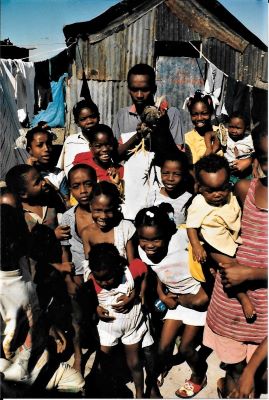Belgrade, Yugoslavia: Sunday July 16, 2000: When I returned from my extensive trip to Iraq last year, I was asked to speak about my experience at the Mount Vernon Country Club near Denver. A man by the name of Jim Peters and his wife waited to talk to me afterward. Jim asked if I had ever been to Belgrade, Yugoslavia. When I told him I hadn’t, he asked to set up an appointment with me to discuss the possibility of such a trip.
When we met at the Project C.U.R.E. office, Jim said, “You’ve been to Baghdad, Iraq, and Havana, Cuba, and other hot spots like Pyongyang, North Korea. Why haven’t you gone to Belgrade?”
“Because Project C.U.R.E. only goes where we’re invited,” I answered.
“Then would you go to Belgrade if you were invited?” Jim inquired.
Part of Project C.U.R.E.’s international success has been because we’ve gone to a lot of political hot spots but have been able to remain nonpolitical. If I had gotten caught up in politics during my trips to Beirut, Lebanon, the Gaza Strip, or the West Bank, I would never have been welcomed back to Israel. If I hadn’t been politically neutral in South Korea, I could have forgotten about being effective in North Korea. By staying neutral, I could work successfully with the hurting Hutus as well as the needy Tutsis in Rwanda, Uganda, and Burundi. If I hadn’t resisted taking sides in Pakistan, India, or Iraq, I would have been dead by now. It’s as simple as that. When I enter a country, I stay focused on the medical needs of the people while being well versed on both sides of the political situation so that I won’t get caught reacting or fumbling. That has admittedly been a risky challenge.
After some long discussions with Jim about the Balkans’ historical problems and the present situation in Yugoslavia, I assured him that I would pursue the possibility of going to Serbia. What I needed was some time alone to pray about it.
Jim is an interesting fellow. He was born and raised in Belgrade and now has a burning desire to go back and help his people after being absent from Yugoslavia since 1944. Germany wreaked havoc on the Balkans during the First World War. Then during World War II, both Germany and Russia unleashed their cruelty on the area. Young Jim Peters (Jacob Petrovic) and his brothers were part of a prominent Belgrade family. They had joined the resistance movement to protect their homeland from the Germans, Italians, and Russians. When Allied pilots from America or Britain would get shot down over Yugoslavia, they would try to get to the pilot first and, through clandestine activities, eventually deliver the pilot back across enemy lines to safety.
Jim and his brother, along with some of their buddies, had been able to save the lives of more than five hundred American and British pilots. But eventually, the Gestapo closed in on them, and Jim and his brother had to flee the country without even saying good-bye to their family. It took them over two years to effect their escape, working their way eventually to Switzerland. From there, two of the American pilots whose lives they had saved sponsored their coming to America, and they arrived in New York in 1947.
The two brothers secured jobs their very first day in America, and through some unusual contacts, they were sponsored to attend Columbia University in New York, and both graduated with MBAs in 1949. Jim’s talents were recognized right away, and he became the international representative for Singer, the sewing-machine company. From there he was able to leapfrog into an international position with RCA, and eventually he worked as senior vice president for Samsonite luggage company, in charge of international business. After fifteen years with Samsonite, Jim retired and then worked as an international consultant for the Mattel toy company. He and his wife subsequently decided to retire in Denver.
Even though Jim wasn’t able to go back to Yugoslavia for many years after his escape, his heart and thoughts were still with his homeland. He kept up on everything taking place in the Balkans over the years. After the death of the Yugoslav dictator Marshal Tito in 1980 and the collapse of the Soviet Union in 1991, Jim felt that it was safe to return to Belgrade for a visit. While he was there, he determined he would do something to help out his loved ones and his mother country. That dream of helping his people eventually led him to contact Project C.U.R.E.
Jim and I originally decided to make the trip to Yugoslavia in the spring of 2000. But we ran into difficulty. The United States had no diplomatic relations with Yugoslavia, so we had to try to get visas through the Yugoslavian embassy in Toronto, Canada. But we were refused visas without personal invitations from the authorities in Belgrade. I wanted to keep a very low profile and just slip into the country, do the Needs Assessment Studies, and slip right back out again. I didn’t want to get involved with Slobodan Milošević’s government officials or with members of the opposition or resistance groups there.
Jim was able to get members of his family in Belgrade to contact the head of a hospital in Belgrade who had some influence and knew how desperately they needed medical goods. The doctor wrote letters of official invitation for us. But before our visas could be issued, the US State Department, along with the International War Crimes Tribunal, announced they were placing a five-million-dollar price tag on the head of Slobodan Milošević. Anyone capturing Milošević or providing information leading to his capture would get the bounty.
That made government officials very nervous about anybody wanting to visit Yugoslavia from the United States. So Jim and I didn’t get our visas. Later, the embassy in Toronto did issue my visa, but it covered dates that had already passed. Jim kept up the phone calls and pressure on the embassy. Finally they wanted to know why James W. Jackson traveled with two US passports and assumed that I must be a spy. Jim Peters patiently explained that the State Department had issued two passports to me because I would always travel with one passport while the other passport was with embassies that were processing my visa requests for future trips. When I returned from a trip I’d trade passports at my office and travel with that one while the office secured visas for my next trip using the other one. Toronto was satisfied with the explanation, and I received my visa in Denver while I was away in Vietnam.
With invitations and visas in hand, Jim and I had to make quick flight arrangements. All the airlines were setting passenger records for flights to and from Europe, so it was quite miraculous that we were able to get any reservations at all on such short notice. As always, my prayer through all the planning has been that I would be willing to go if I’m supposed to go, but I certainly don’t need to go where I shouldn’t go, and I’m totally dependent upon God to reveal to me the subtle difference.
Next Week: Confusion and Chaos in Belgrade











